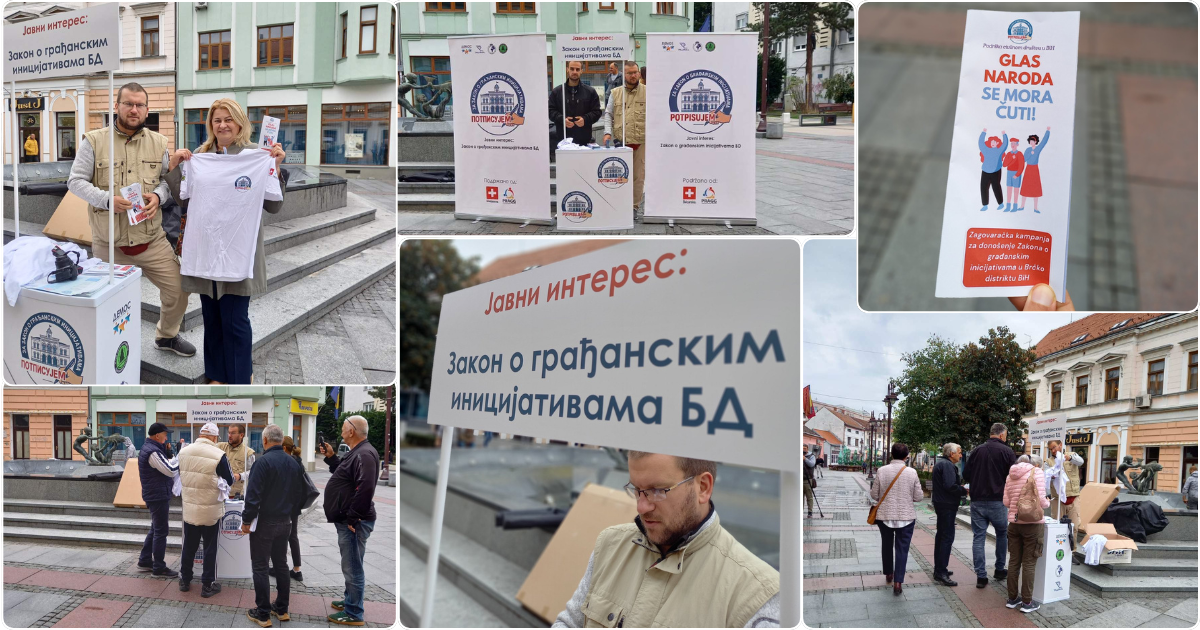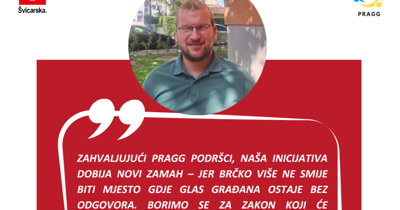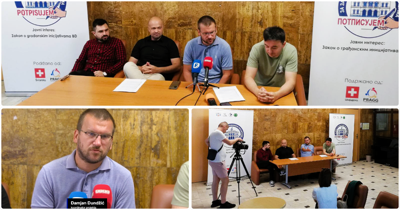
Brčko District remains in a legal vacuum when it comes to laws governing citizens’ initiatives. In practice, this means that any proposal coming from citizens—whether it concerns environmental protection or changes to local regulations—depends entirely on the goodwill of the authorities. And most often, it is simply ignored.
In July this year, representatives of the civil sector, within a campaign launched with PRAGG support, submitted an initiative to the Mayor of Brčko District BiH, requesting that the Government’s 2025 work program be amended to include an obligation to adopt the Law on Citizens’ Initiatives.
“We submitted an initiative to the Government of Brčko District BiH, requesting that the 2025 Government Work Program include the undertaking of necessary measures to draft and send the Law on Citizens’ Initiatives into the Assembly procedure. This includes forming a special working group to prepare the draft law and submit it to the Brčko District Assembly for consideration.
We hope that a representative of civil society will also be included in this working group to make the process more transparent and closer to citizens.
At the same time, we held meetings with the mayor and the head of the Department for Professional and Administrative Affairs and established cooperation with many civil society organizations that have become co-signatories of the initiative. In this way, we have demonstrated that this demand represents a broader civic need,” say activists from the citizens’ association Demos Brčko.
The initiative follows a series of attempts by citizens to initiate social change—from environmental to social issues—that have gone unanswered due to the absence of a clear legal framework. Activists believe it is time for Brčko to legally recognize citizens’ right to launch initiatives, as is already the case in other administrative units across Bosnia and Herzegovina.
However, it is evident that politicians are not particularly enthusiastic about this demand for greater citizen participation in decision-making. The promised working group for drafting the law has still not been formed. With the end of the year approaching, it is clear that the law will not be adopted anytime soon.
This means that pressure must be increased to ensure that both the Government and the Assembly of Brčko District include the obligation to adopt the Law on Citizens’ Initiatives in their 2026 work programs, as one of their priorities.
“The Law on Citizens’ Initiatives in Brčko District is crucial in the context of widespread distrust in institutions and politicians. We have 31 representatives in the Brčko District Assembly who are supposed to represent the interests of all citizens, as well as those holding higher public offices such as the mayor, members of the judiciary, and the prosecution. However, these people generally do not act in the public interest.
We rarely see initiatives that truly benefit citizens or address issues of essential public concern—such as the high levels of corruption and crime. I would say we live in a mafia state.
The introduction of a law on citizens’ initiatives would empower citizens—the last ones left who can still improve this society—to directly show politicians how change can happen even without them.
I believe that adopting this law would encourage citizens to propose more initiatives. The media also play a vital role in promoting these initiatives and providing them with space, thereby creating public pressure on institutions to take them seriously. Media, authorities, and citizens must work together, as this is in everyone’s public interest,” says Adis Mujdanović, journalist and activist.
“The Law on Citizens’ Initiatives in Brčko District is an essential tool that will guarantee citizens—once they follow the procedures outlined by the law—that their initiatives stand a real chance of being placed on the agenda of the Assembly and other institutions. Once adopted, the law will give citizens confidence to act.
In the past, we’ve had many initiatives—some even made it to Assembly sessions—but there is no law that guarantees your proposal will be discussed or voted on unless you have good connections with a political group,” says Damjan Dundžić, activist from the citizens’ association Demos.
According to the activists, once adopted, the Law on Citizens’ Initiatives will serve as a mechanism of accountability for the authorities, as citizens have many ideas worth considering. They also note that people in Brčko District have grown disheartened and apathetic, believing their voices no longer matter. With this law, things could change.
Citizens would gain a formal mechanism enabling their voices, ideas, and proposals to reach decision-making centers—Assembly sessions and other relevant institutions—marking a significant step forward compared to the current situation, where citizens’ initiatives are most often ignored.






